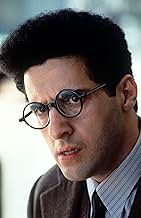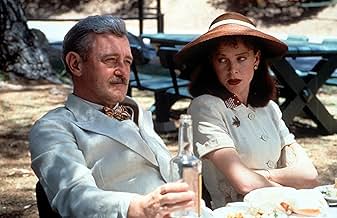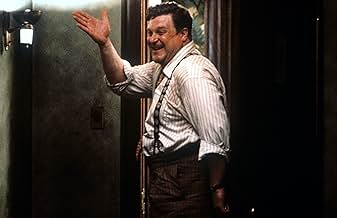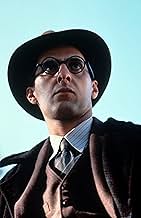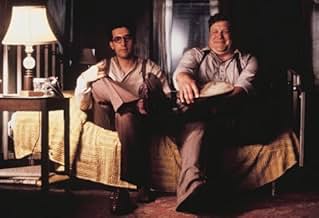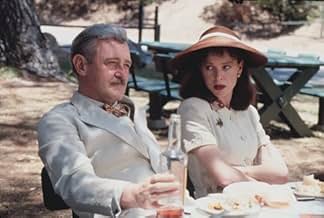Ein renommierter New Yorker Bühnenautor lässt sich von einem Angebot nach Kalifornien locken, um dort für den Film zu arbeiten, und lernt dabei die infernalischen Abgründe Hollywoods kennen.Ein renommierter New Yorker Bühnenautor lässt sich von einem Angebot nach Kalifornien locken, um dort für den Film zu arbeiten, und lernt dabei die infernalischen Abgründe Hollywoods kennen.Ein renommierter New Yorker Bühnenautor lässt sich von einem Angebot nach Kalifornien locken, um dort für den Film zu arbeiten, und lernt dabei die infernalischen Abgründe Hollywoods kennen.
- Regie
- Drehbuch
- Hauptbesetzung
- Für 3 Oscars nominiert
- 19 Gewinne & 29 Nominierungen insgesamt
Meagen Fay
- Poppy Carnahan
- (as Megan Faye)
Empfohlene Bewertungen
Re-watching this after I guess decades?
I enjoyed it but not overwhelmingly so. I think less than when i originally watched.
However I am reading, with amusement, the other reviews on here. They go on and on about how the movie skewers Hollywood and New York elites. No it doesn't. Instead this movie is dead simple: a playwright who says he is for the common man (and I mean man) is not really so. He is more interested in being seen as the great artist.
How do we see this?
He comes out to Hollywood and goes on and on in front of John Goodman about how he is for he common man while ignoring what Goodman had to say. Goodman repeated three times how he had stories to tell and Fink just ignored him.
Fink is more interested in himself as the great writer than actually focusing on the ask: write a wrestling movie, don't overthink it, write something similar to what others have done.
How do we see this? He insists on staying in a fleabag hotel as a sort of hairshirt to goose his artistic suffering and therefore creativity. But he doesn't need that creativity as he has been asked to write a straightforward wrestling movie in the style of past movies.
He could have stayed in a fancy hotel, enjoyed the lifestyle and written the wrestling movie.
Oh and those Hollywood elites? What the same ones who want to put out a wrestling movie that the public loves. Some elites huh!
I enjoyed it but not overwhelmingly so. I think less than when i originally watched.
However I am reading, with amusement, the other reviews on here. They go on and on about how the movie skewers Hollywood and New York elites. No it doesn't. Instead this movie is dead simple: a playwright who says he is for the common man (and I mean man) is not really so. He is more interested in being seen as the great artist.
How do we see this?
He comes out to Hollywood and goes on and on in front of John Goodman about how he is for he common man while ignoring what Goodman had to say. Goodman repeated three times how he had stories to tell and Fink just ignored him.
Fink is more interested in himself as the great writer than actually focusing on the ask: write a wrestling movie, don't overthink it, write something similar to what others have done.
How do we see this? He insists on staying in a fleabag hotel as a sort of hairshirt to goose his artistic suffering and therefore creativity. But he doesn't need that creativity as he has been asked to write a straightforward wrestling movie in the style of past movies.
He could have stayed in a fancy hotel, enjoyed the lifestyle and written the wrestling movie.
Oh and those Hollywood elites? What the same ones who want to put out a wrestling movie that the public loves. Some elites huh!
You are either going to love or hate this one, and I doubt you'll know which until it's over. Maybe you won't know even then.
In 1941, Barton Fink (John Turturro) is a successful Broadway playwright. Now that he's got some success under his belt, he says he wants to write plays for "the common man". But his agent has a tempting offer. A movie studio wants him to come to LA and write screenplays for 1000 dollars a week. The agent convinces him to go. Barton checks into the Hotel Earle, which has ornate decorations in the common areas, but is a dump from the standpoint of Barton's room. The heat has the wallpaper peeling off the walls. The sole decoration in Barton's room is the picture of a woman sitting on the beach, her arm raised to block the sun. Remember this picture - it's important.
Barton's first assignment is to write a "wrestling picture" starring Wally Beery. But Barton has writer's block for assorted reasons, one of them being that he knows nothing about this subject. So he stares at his typewriter with the dread an insomniac might stare at his bed. But then what seemed to start out being a film about how the studio system can beat the creativity and the confidence out of a successful writer changes course and becomes something that is completely surreal and even nightmarish by the end. I can really say nothing more specific than that without giving things away.
The Coens wrote Barton Fink when they were having writer's block trying to write Miller's Crossing because of the complexity of the plot. So did they manage to pack lots of symbolism into a tight, coherent package, or did they simply let their imagination run wild and undisciplined in an attempt to get back on track on the other film? I have no idea. I just know that I like it and - for me - it's great for repeat viewings.
One more thing - How can it be so hot in LA, and then suddenly WWII has started, which would make it December? Why is it Barton doesn't seem to notice WWII has started without being told and then really has no reaction. He really isn't plugged into "the common man" is he?
In 1941, Barton Fink (John Turturro) is a successful Broadway playwright. Now that he's got some success under his belt, he says he wants to write plays for "the common man". But his agent has a tempting offer. A movie studio wants him to come to LA and write screenplays for 1000 dollars a week. The agent convinces him to go. Barton checks into the Hotel Earle, which has ornate decorations in the common areas, but is a dump from the standpoint of Barton's room. The heat has the wallpaper peeling off the walls. The sole decoration in Barton's room is the picture of a woman sitting on the beach, her arm raised to block the sun. Remember this picture - it's important.
Barton's first assignment is to write a "wrestling picture" starring Wally Beery. But Barton has writer's block for assorted reasons, one of them being that he knows nothing about this subject. So he stares at his typewriter with the dread an insomniac might stare at his bed. But then what seemed to start out being a film about how the studio system can beat the creativity and the confidence out of a successful writer changes course and becomes something that is completely surreal and even nightmarish by the end. I can really say nothing more specific than that without giving things away.
The Coens wrote Barton Fink when they were having writer's block trying to write Miller's Crossing because of the complexity of the plot. So did they manage to pack lots of symbolism into a tight, coherent package, or did they simply let their imagination run wild and undisciplined in an attempt to get back on track on the other film? I have no idea. I just know that I like it and - for me - it's great for repeat viewings.
One more thing - How can it be so hot in LA, and then suddenly WWII has started, which would make it December? Why is it Barton doesn't seem to notice WWII has started without being told and then really has no reaction. He really isn't plugged into "the common man" is he?
The Coen brothers have come a long way from their start with an 8mm camera. They have written and produced some great homages to the film noir era of Hollywood, and this film is no exception.
First, is the great dialog written by the brothers. Great dialog is a feature of their films, and this one has some of the most memorable I have heard. You can almost turn off the visual and just listen and be enchanted and know you are listening to a Coen brothers film.
But turning off the visual would deprive you of the great cinematography of Roger Deakins. His can frame a scene to the point that you could pause the film and just soak in the texture and color and realism. It is almost as if every frame is a painting.
The Coen brothers also seem to get the best performances out of an actor that I have seen. John Goodman is brilliant in this film and he seems to do his best work for the Coens. John Turturro is captivating as the hack writer who talks about his love for the common man, but just really doesn't know the common man and really doesn't care about them. Michael Lerner was brilliant as the requisite man behind the desk that is the feature of 40's noir.
One doesn't always know what is in the Coen brothers minds. Is this a foretelling of the rise of Nazism, of intellectuals who really didn't understand the appeal of fascism to the common man, or a surreal portrait of someone who sells out. No matter what their intention, they make you think and return to see their films again and again.
First, is the great dialog written by the brothers. Great dialog is a feature of their films, and this one has some of the most memorable I have heard. You can almost turn off the visual and just listen and be enchanted and know you are listening to a Coen brothers film.
But turning off the visual would deprive you of the great cinematography of Roger Deakins. His can frame a scene to the point that you could pause the film and just soak in the texture and color and realism. It is almost as if every frame is a painting.
The Coen brothers also seem to get the best performances out of an actor that I have seen. John Goodman is brilliant in this film and he seems to do his best work for the Coens. John Turturro is captivating as the hack writer who talks about his love for the common man, but just really doesn't know the common man and really doesn't care about them. Michael Lerner was brilliant as the requisite man behind the desk that is the feature of 40's noir.
One doesn't always know what is in the Coen brothers minds. Is this a foretelling of the rise of Nazism, of intellectuals who really didn't understand the appeal of fascism to the common man, or a surreal portrait of someone who sells out. No matter what their intention, they make you think and return to see their films again and again.
I recently purchased "Barton Fink" along with "Miller's Crossinhg", another Coen Brothers gem.
Barton Fink quite simply is a writer who cannot see the forest for the trees. He is so taken with the fact that he is a writer that he can't write. He is so idealistic that he misses fantastic opportunities to become a writer for the ages because he wastes precious time proselytizing. John Goodman perfectly sums up everyone's frustration with Barton Fink when after a series of unfortunate occurrences, Barton asks him "Why me?" to which John's character answers "Because you don't LISTEN!" Set in 1930s Hollywood we follow the exploits of a one-hit wonder, Barton Fink, who has written a successful Broadway play and is summoned by the powers that be to Hollywood. After much cajoling to take the job from his agent, Barton arrives in Los Angeles determined to become the writer for the common man where he insists true stories live. The trouble with Barton, however, is he does not have time for the common man because he has so romanticized their lot as well as his particular quest in speaking for them.
Excellent performances from John Turturo, John Goodman, Judy Davis, John Polito (often overlooked, but his scenes ALWAYS become his!!) and the inimitable Tony Shaloub.
I have decided after a slew of Coen Brothers films I currently have in my collection, that any project these guys are involved with deserve more than passing scrutiny.
Barton Fink quite simply is a writer who cannot see the forest for the trees. He is so taken with the fact that he is a writer that he can't write. He is so idealistic that he misses fantastic opportunities to become a writer for the ages because he wastes precious time proselytizing. John Goodman perfectly sums up everyone's frustration with Barton Fink when after a series of unfortunate occurrences, Barton asks him "Why me?" to which John's character answers "Because you don't LISTEN!" Set in 1930s Hollywood we follow the exploits of a one-hit wonder, Barton Fink, who has written a successful Broadway play and is summoned by the powers that be to Hollywood. After much cajoling to take the job from his agent, Barton arrives in Los Angeles determined to become the writer for the common man where he insists true stories live. The trouble with Barton, however, is he does not have time for the common man because he has so romanticized their lot as well as his particular quest in speaking for them.
Excellent performances from John Turturo, John Goodman, Judy Davis, John Polito (often overlooked, but his scenes ALWAYS become his!!) and the inimitable Tony Shaloub.
I have decided after a slew of Coen Brothers films I currently have in my collection, that any project these guys are involved with deserve more than passing scrutiny.
I'm still not entirely sure what to think of this film. One thing is sure, it won't be easy to forget. This movie is clearly the product of a writer who has struggled with their muse, and equally one who has a healthy mistrust of Hollywood - the sausage grinder. Although Hollywood has been critiqued in film before in similar ways, memorable scenes, clever dialogue, quality acting, and a surreal plot and setting, add together to make this an unusual and different film. Maybe another viewing might add a different dimension. This is by no means 'light entertainment' and it leaves plenty of questions unanswered. But on the whole, an intelligent movie, if something of an enigma. My vote 7/10
Wusstest du schon
- WissenswertesThe first film to win all three major awards (Palme D'or, Best Director, and Best Actor) at the Cannes Film Festival. Also, it was unanimously chosen for the Palme D'or.
- PatzerBriefly visible at the top of the screen when Detective Mastrionotti introduces himself to Barton.
- Zitate
Charlie Meadows: Look upon me! I'll show you the life of the mind!
- Crazy CreditsThe 20th Century Fox logo appears over silence; the "fanfare" is not played.
- VerbindungenEdited into The Clock (2010)
- SoundtracksFor Sentimental Reasons
by Edward Heyman, Al Sherman and Abner Silver
Licenced with Permission the Successors of Marlo Music Corporation (ASCAP)
Top-Auswahl
Melde dich zum Bewerten an und greife auf die Watchlist für personalisierte Empfehlungen zu.
Details
- Erscheinungsdatum
- Herkunftsländer
- Sprache
- Auch bekannt als
- Бартон Фінк
- Drehorte
- Produktionsfirmen
- Weitere beteiligte Unternehmen bei IMDbPro anzeigen
Box Office
- Budget
- 9.000.000 $ (geschätzt)
- Bruttoertrag in den USA und Kanada
- 6.153.939 $
- Eröffnungswochenende in den USA und in Kanada
- 268.561 $
- 25. Aug. 1991
- Weltweiter Bruttoertrag
- 6.154.231 $
- Laufzeit
- 1 Std. 56 Min.(116 min)
- Farbe
- Sound-Mix
- Seitenverhältnis
- 1.85 : 1
Zu dieser Seite beitragen
Bearbeitung vorschlagen oder fehlenden Inhalt hinzufügen




